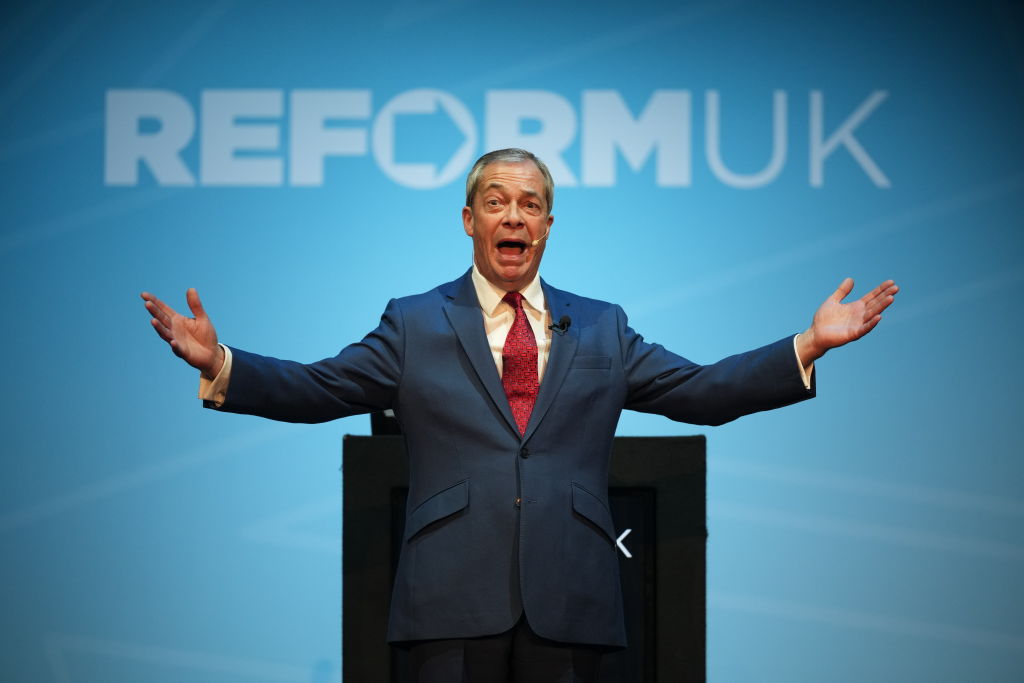Who really won the by-election in Caerphilly? I know officially it was Plaid Cymru, and I wouldn’t want to diminish that funny little party’s glee. Congrats, etc. But the true victor was a far newer party. An angry party. A party of the fretful and anxious. A party so fresh it doesn’t even have a name yet. I say we call it Not Reform.
Farage is now the behemoth of British politics, so much so that pretty much all elections now boil down to this question: Reform UK or Not Reform UK?
I think it is pretty clear that it was this nameless entity that propelled Plaid Cymru’s Lindsay Whittle to victory last night. That this seismic upset was fuelled less by a burning enthusiasm for the petit-bourgeois nationalism of those Welsh breakaways than by a growing middle-class angst over Nigel Farage. And in that sense, Caerphilly really has prepared the ground for the next general election.
No one can deny what a hand grenade in the body politic this by-election has been. It is brutish proof of the withering of the two big parties. Labour has dominated this part of Wales for decades and yet last night its vote share plummeted by 35 per cent. It got 3,713 votes. There are Monster Raving Loonies who’ve got more. As for the Conservatives – 690 votes! That’s the numerical territory of bored housewives who run on single issues, like fixing potholes.
The entire election felt like a glorious yelp of democratic disdain for Labour and the Tories. It became a clash of the outsiders – Plaid Cymru and Reform UK. Plaid’s victory has caused much gloating among Faragephobic leftists. I don’t know why, for another thing confirmed in this by-election is that Farage is now the behemoth of British politics, so much so that pretty much all elections now boil down to this question: Reform UK or Not Reform UK?
Tactical voting was key to Plaid’s victory. They benefited not so much from a surge in interest in their potty vision of an independent Wales than from the anti-Reform doomerism of the other parties. As Peter Walker of the Guardian says, Plaid became the ‘Stop Reform UK’ party. That’s why the Lib Dems, like Labour, lost votes too, and why the insurgent Greens made barely any gains: because the backers of these ‘progressive’ parties all plumbed for Plaid in a desperate bid to keep Reform out.
Lord Adonis no doubt spoke for many in the depressed leafy classes who still pine for Brussels when he cheered Caerphilly’s ‘protean anti-Reform coalition’. We good folk must line up behind any ‘candidate able to beat Farage’, he said. And of course there is nothing wrong with tactical voting. All’s fair in love and politics.
And yet the irony of this burgeoning Stop Reform movement is that it copperfastens Farage’s historic importance. It confirms working-class voters in their belief that if they want to give the establishment a black eye – or better yet push Britain in a new direction – then Farage is their man. The digital leftists and Brexit mourners maniacally sworn to stopping Reform might just be digging their own political graves. For their anti-Farage mania inevitably stokes and stirs its opposite: a mass belief that only Farage can overhaul our creaking system.
Something extraordinary has happened in British politics these past few months: pretty much every party has become little more than a glorified wing of Not Reform. It’s been clear since conference season, when from Keir Starmer to Zack Polanski they all yapped about how they would Stop Farage.
The Greens are the youth wing of Not Reform. If you’re a member of the overeducated middle classes and you still think someone with a penis can be a lesbian, this is the wing of ABF (Anyone But Farage) for you. Your Party is the Islamist wing of Not Reform. This is the wing that calls Farage a fascist and yet is happy to march shoulder to shoulder with wailing jihadists who dream of destroying the world’s only Jewish state.
The Lib Dems are the Home Counties wing of Not Reform. We’ll stop Farage from turning Britain into ‘Trump’s America’, says Ed Davey, leader of this particular faction of Faragephobia. Labour are the public sector wing of Not Reform. Employees of ‘the blob’, who dread Farage’s scythe of cuts, will likely vote Labour less out of love than sheer self-preservation.
And the Tories? Their nitpicking at Reform policies suggests they want to position themselves as the sensibles of Not Reform – the wing you should vote for if you kind of like Nigel but think he’s a bit much.
It is mind-blowing that virtually the entire political class now defines itself by its opposition to Reform UK. What a testament to the epoch-shaping impact Farage and his happy band of insurgents have had these past few years. This is why Caerphilly was only technically a defeat for Reform UK – because deeper down it confirmed that Reform UK is the only political game in town, and you’re either for it or against it.
The next general election is shaping up to be a sequel to Brexit. It feels like we will once again be asked to Remain or Leave. Let the old establishment Remain intact, or Leave it in the dust by voting Reform – British politics is slowly moulding itself around this electrifying question.








Comments